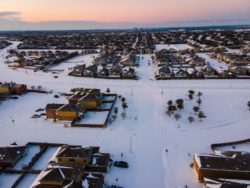

HARC’s work in air quality research and project management includes air quality modeling, health impact assessments, emission reduction technologies, air pollution and greenhouse gas emissions inventories, air quality monitoring technology and policy, and regional mitigation of and adaptations to climate change. The air research program is multi-disciplinary, multi-institutional, objective and non-partisan. HARC’s air quality work synthesizes rigorous research and policy assessment in a dynamic way that has become a HARC trademark in the region.
View Air ResourcesHARC’s air quality research seeks to demonstrate how regulatory structures and an ever-dynamic climate change driven environment impact air emissions, air quality, and public health and to reveal the contributors of air pollution through comprehensive modeling and data analysis practices.
HARC’s air quality team develops and demonstrates appropriate practices for air quality model applications and evaluations in a community-focused research framework. It employs a combination of traditional and novel modeling techniques to assess local, reginal, state, and national air quality using the Community Multiscale Air Quality (CMAQ) model, Comprehensive Air quality Model with extensions (CAMx) model, and machine learning modeling approaches.

During Winter Storm Uri, refineries and petrochemical facilities across Texas were also forced to shut down due to power, gas, and water outages affecting production. Emergency shutdowns often result in the release of pollutants above permitted levels and may further exacerbate the effects of power and water supply issues in vulnerable communities. In addition to outdoor air quality issues, many households without power or heating suffered accidental injuries and even deaths from improper use of generators, stoves, or fireplaces while trying to stay warm.
In response, HARC created the Winter Storm Uri Experience, an online application that details how the storm impacted systems well beyond the electrical grid. HARC’s researchers analyzed various datasets to distill specific impacts from the storm.

To study the impacts of Air Quality on community health, we use various datasets including EPA’s AirNow (for nationwide observed criteria pollutants, air toxics, and meteorology), EPA’s National Emission Inventory (NEI) database (for nationwide air emissions of criteria pollutants, criteria precursors, and hazardous air pollutants from air emissions sources), NOAA’s Vulcan (for nationwide carbon dioxide (CO2) emissions from the combustion of fossil fuels and cement production), and NASA’s fleet of Earth-observing satellites (for global levels of nitrogen dioxide (NO2), ozone & precursors, and particulate matter & precursors).
Most recently, HARC researchers analyzed the impact from urban heat islands in our area. Working with multiple community partners, the team collected data and then produced a report to better inform communities on where the heat is highest and helped to identify key next steps for these areas.
